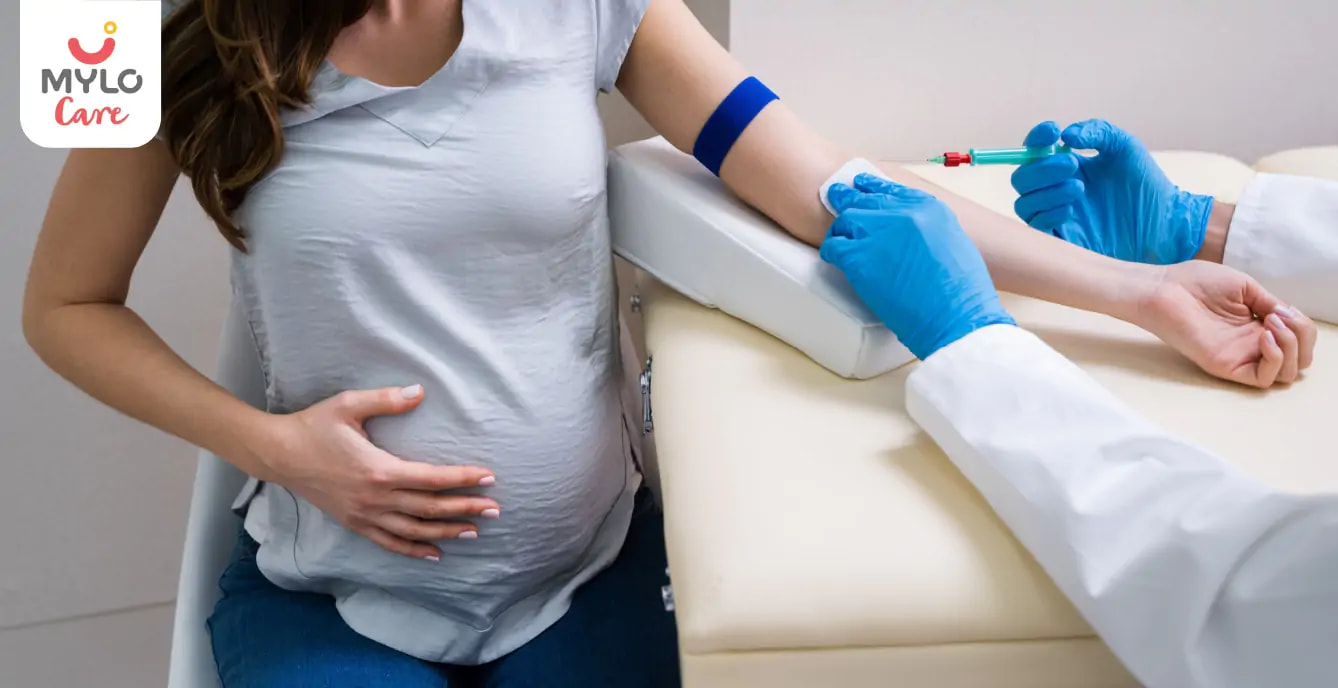Home

Epithelial Cells in Urine: Causes, Types, and Treatment Explained
In this Article

Pregnancy
Epithelial Cells in Urine: Causes, Types, and Treatment Explained
Updated on 3 November 2023



Medically Reviewed by
Dr. Madhavi Gupta
Gynecological disorders, Antenatal care ( Garbhini paricharya), Post-natal care, Lactation, Fertility-related problems. - Bachelor of Ayurvedic Medical Science (B.A.M.S)
View Profile

Urine is a vital component of the excretory system that plays a crucial role in eliminating waste products from the body. Urine analysis is a routine diagnostic test to assess the health of an individual. One of the important components of urine analysis is the presence of epithelial cells in urine. Epithelial cells are cells that line the urinary tract and are shed in urine.
The presence of these cells in urine can indicate a variety of conditions, ranging from a normal shedding of cells to potential infections or diseases. In this article, we will explore the reasons for epithelial cells in urine test and what it can indicate about an individual's health.
What are Epithelial Cells?
Epithelial cells are the cells that cover the surface of the body both internally and externally and act as a barrier to protect your body from the entry of viruses. Epithelial cells are found in the skin, digestive tract, blood vessels, urinary tract, and organs. Epithelial cells in urine means cells that originate from the lining of various parts of the urinary tract, including the kidneys, ureters, bladder, and urethra. These cells can be shed into the urine during the natural process of cell turnover in the urinary system.
A few number of epithelial cells are normal. However, high a high number may signify urinary tract infection, kidney disease, or any other medical condition. The presence of specific types of epithelial cells may provide clues to the possible origin of the cells and assist in diagnosing certain conditions.
Epithelial Cells in Urine Normal Range
Epithelial cells are normal cells found in urine, with squamous and transitional epithelial cells being the most common types. The squamous epithelial cells range from 15-20 cells per high power field or less. A "few" epithelial cells are typically considered normal in a urinalysis. However, a large number of epithelial cells may indicate a urinary tract infection, kidney disease, or other serious medical condition. Normal epithelial cells in urine can vary depending on the individual's health and lifestyle factors.
You may also like: Types of Vaginal Discharge, What They Mean and What is Normal?
Causes of High Epithelial Cells in Urine
Following are some of the most common reasons for the presence of epithelial cells:
1. Specimen contamination
Sometimes using an unsterile collection cup can contaminate your urine sample. In some cases, epithelial cells in urine test may also be due to unclean genitals. In a situation like this, if the urine sample has been contaminated, repeat the test to get accurate results.
2. Urinary tract infection (UTI)
Most of the time, if there is the presence of higher epithelial cells in the urine, it is mostly due to urinary tract infections. There will be the presence of microorganisms, and in some cases, there will be mucus strings.
3. Kidney problems
If tubular or columnar shapes of epithelial cells are observed in the urine sample, it may indicate kidney problems. Because columnar and tubular cells are most commonly seen in the kidneys. If most of the cells are columnar, this might be a sign of severe kidney injury with a risk of reduced functioning of the kidney.
You may also like: Causes of Itching & Foul Smell From Vagina & How to Get Rid of It
Risk Factors for High Epithelial Cells
A person is at high risk of having increased epithelial cells in urine test if they have:
- Diabetes
- Kidney stones
- History of kidney disease
- High blood pressure
- Frequent UTIs
- A weak immune system
- Enlarged prostate
- Pregnancy
You may also like: Top 10 Health Issues Related To Women
Types of Epithelial Cells in Urine
There are three types of epithelial cells commonly found in urine, namely:
1. Squamous epithelial cells
These cells are larger. They are usually found in the vagina and urethra. They usually appear because of contamination.
2. Renal tubular cells
If there is an increase in renal tubular cells in the urine, this may indicate a kidney disorder.
3. Transitional epithelial cells
These cells can come from the male urethra and renal pelvis and sometimes are found in the bladder of old men. The presence of a high quantity of these cells may be a sign of UTI.
You may also like: Is It Beneficial to Invest in Stand and Pee Products for Women?
Why Do You Need a Urine Epithelial Cells Test?
A urine epithelial cell test is performed as a part of a routine checkup. This test may be recommended by the doctor, if a person has a symptom of a urinary infection or kidney dysfunction, such as:
- Frequent and painful urination
- Back pain
- Abdominal pain
Interpretation of Test Results
The results are often reported as little, moderate, or higher levels. Naturally, epithelial cells are shed from the body. It is normal to have a few squamous cells in the urine. But having high epithelial cells in the urine (more than 15 renal tubular epithelial cells per HPF) may indicate:
- Urinary tract infection
- Yeast infection
- Liver disease
- Kidney disease
- Cancers
If the test results are not within the normal range and there are increased epithelial cells in urine, that does not mean there is a serious medical condition that needs treatment. Getting a few more tests will give a proper diagnosis. For a better interpretation of the results, consult a doctor.
What are the Treatments?
Treatment is based on levels of epithelial cells present in urine. The common cause of high levels of epithelial cells in urine is due to a UTI, and treatment for UTI includes antibiotics or antiviral medication. There are different ranges of treatments for kidney disease, depending on the underlying cause. Lifestyle changes are recommended, including weight loss, regular exercise, and a healthy diet.
Prevention
Staying hydrated is important to prevent the conditions that cause high epithelial cells. Drinking several glasses of water per day will be helpful. Additionally, cranberry juice has antioxidant properties that promote good health of kidney, and many people use it as a home remedy for UTIs.
Summary
If a urine test shows the presence of epithelial cells in urine, it may be due to a contaminated sample. Additionally, increased epithelial cells in urine can be a sign of infection, like a UTI or kidney disorder. People experiencing symptoms of UTI or any kidney problems should visit a doctor for urinalysis. Only a doctor can interpret the results and decide the further treatment. The sooner the diagnosis, the treatment can be faster to reduce the symptoms.
References
- William H. Kern, M.D., (1961). Epithelial Cells in Urine Sediments, American Journal of Clinical Pathology
- Poloni JAT, de Oliveira Vieira A, Dos Santos CRM, Simundic AM, Rotta LN. (2021). Survey on reporting of epithelial cells in urine sediment. NCBI
Tags
Epithelial Cells in Urine in Hindi, Epithelial Cells in Urine in Bengali, Epithelial Cells in Urine in Telugu, Epithelial Cells in Urine in Tamil





Medically Reviewed by
Dr. Madhavi Gupta
Gynecological disorders, Antenatal care ( Garbhini paricharya), Post-natal care, Lactation, Fertility-related problems. - Bachelor of Ayurvedic Medical Science (B.A.M.S)
View Profile


Written by
Roohi Kalra
Get baby's diet chart, and growth tips

Related Articles
Related Questions
Hello frnds..still no pain...doctor said head fix nhi hua hai..bt vagina me pain hai aur back pain bhi... anyone having same issues??

Kon kon c chije aisi hai jo pregnancy mei gas acidity jalan karti hain... Koi btayega plz bcz mujhe aksar khane ke baad hi samagh aata hai ki is chij se gas acidity jalan ho gyi hai. Please share your knowledge

I am 13 week pregnancy. Anyone having Storione-xt tablet. It better to have morning or night ???

Hlo to be moms....i hv a query...in my 9.5 wk i feel body joint pain like in ankle, knee, wrist, shoulder, toes....pain intensity is high...i cnt sleep....what should i do pls help....cn i cosult my doc.

Influenza and boostrix injection kisiko laga hai kya 8 month pregnancy me and q lagta hai ye plz reply me

Related Topics
RECENTLY PUBLISHED ARTICLES
our most recent articles

Diet & Nutrition
গর্ভাবস্থায় আলুবোখরা: উপকারিতা ও ঝুঁকি | Prunes During Pregnancy: Benefits & Risks in Bengali

Diet & Nutrition
গর্ভাবস্থায় হিং | ঝুঁকি, সুবিধা এবং অন্যান্য চিকিৎসা | Hing During Pregnancy | Risks, Benefits & Other Treatments in Bengali

Women Specific Issues
স্তনের উপর সাদা দাগ: লক্ষণ, কারণ এবং চিকিৎসা | White Spots on Nipple: Causes, Symptoms, and Treatments in Bengali

Diet & Nutrition
গর্ভাবস্থায় পোহা: উপকারিতা, ধরণ এবং রেসিপি | Poha During Pregnancy: Benefits, Types & Recipes in Bengali

Diet & Nutrition
গর্ভাবস্থায় মাছ: উপকারিতা এবং ঝুঁকি | Fish In Pregnancy: Benefits and Risks in Bengali

Diet & Nutrition
গর্ভাবস্থায় রেড ওয়াইন: পার্শ্ব প্রতিক্রিয়া এবং নির্দেশিকা | Red Wine During Pregnancy: Side Effects & Guidelines in Bengali
- ইনার থাই চ্যাফিং: কারণ, উপসর্গ এবং চিকিৎসা | Inner Thigh Chafing: Causes, Symptoms & Treatment in Bengali
- গর্ভাবস্থায় ব্রাউন রাইস: উপকারিতা ও সতর্কতা | Brown Rice During Pregnancy: Benefits & Precautions in Bengali
- Velamentous Cord Insertion - Precautions, Results & Safety
- Unlock the Secret to Flawless Skin: 7 Must-Have Qualities in a Face Serum
- Unlock the Secret to Radiant Skin: How Vitamin C Serum Can Transform Your Complexion
- Gender No Bar: 10 Reasons Why Everyone Needs a Body Lotion
- Unlock the Secret to Radiant Skin How to Choose the Perfect Body Lotion for Your Skin Type
- Top 10 Reasons to Apply a Body Lotion After Every Bath
- Communication in Toddlers: Milestones & Activities
- How to Improve Vocabulary for Toddlers?
- A Comprehensive Guide to Understanding Placenta Accreta
- Vulvovaginitis in Toddlers Causes, Symptoms and Treatment
- A Comprehensive Guide to Understanding Cerebral Palsy in Children
- Bitter Taste in Mouth During Pregnancy: Understanding the Causes and Remedies


AWARDS AND RECOGNITION

Mylo wins Forbes D2C Disruptor award

Mylo wins The Economic Times Promising Brands 2022
AS SEEN IN

- Mylo Care: Effective and science-backed personal care and wellness solutions for a joyful you.
- Mylo Baby: Science-backed, gentle and effective personal care & hygiene range for your little one.
- Mylo Community: Trusted and empathetic community of 10mn+ parents and experts.
Product Categories
baby carrier | baby soap | baby wipes | stretch marks cream | baby cream | baby shampoo | baby massage oil | baby hair oil | stretch marks oil | baby body wash | baby powder | baby lotion | diaper rash cream | newborn diapers | teether | baby kajal | baby diapers | cloth diapers |








